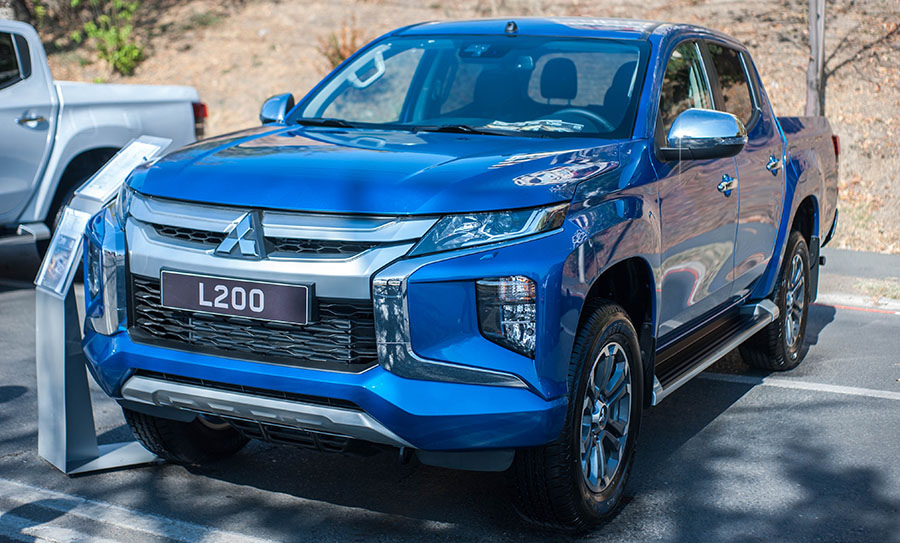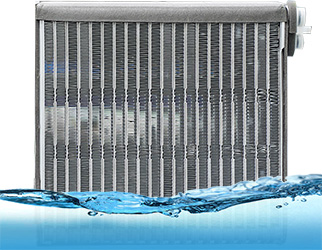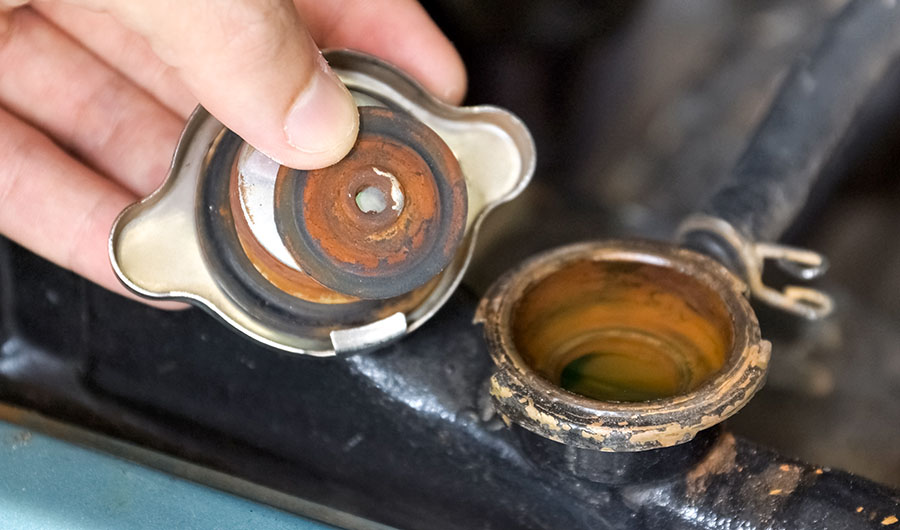Sloshing sounds in the cabin of Mitsubishi L200 should not be ignored. If the noise is due to accumulation of water somewhere, it can lead to unwanted bacteria growth like mold or mildew, which can cause musty odor in your vehicle.

The most common causes of sloshing sound in Mitsubishi L200 are clogged evaporator condensate drain, low coolant, air in coolant system, clogged door drain, and clogged windshield drain.
1. Clogged evaporator drain
When you turn on the air conditioning system in your L200, moisture develops along the evaporator coil and then drips down into a condensate drain pan, which then drips under the vehicle. If the drain is clogged or is not draining properly, water will accumulate in the pan and make sloshing sound when the vehicle is moving.

Risk of mold growth
The stagnant water in the evaporator condensate pan becomes a perfect breeding ground for mold growth and can also cause the water to leak on the floorboard of your Mitsubishi L200. When the AC is in operation, air passes through the evaporator area and if there is mold growth, the air from the AC vents will smell bad. Inhaling these unpleasant musty odors is not only irritating, breathing the airborne microscopic mold spores can cause allergic reactions in sensitive individuals; such as sneezing, runny nose, red eyes, nausea, and skin rash.
Symptoms of clogged drain
If the moisture/water is accumulating in the condensate pan due to clogged drain, you may hear a sloshing water sound coming from behind the dashboard and is especially noticeable when making turns and when braking. If left unchecked, the interior of your L200 may develop bad moldy smell especially when you turn on the AC. Another symptom is damp floorboard; if too much water accumulates in the pan, it can overspill into the interior of your vehicle.
How to unclog the drain
The easiest method to unclog a condensate drain in L200 is by using compressed air. Locate the evaporator drain tube under your vehicle and blow compressed air into the tube hole. Dirty moldy water may gush out as soon as you blow in compressed air, so wear safety glasses and keep your face away from under the drain tube.
If you don’t have compressed air, you can try unclogging the drain by inserting a flexible wire into the tube hole. Give it a good wiggle to loosen up any caked-in dirt and grime in the drain.
2. Low coolant
Low coolant level in L200 can cause sloshing sound from behind the dashboard when the engine is running. The sound is most prominent right after you start the vehicle.
Why low coolant causes sloshing sound in L200
The heating system in L200 uses warm coolant/antifreeze from the engine block to heat the interior of the vehicle. The warm coolant is pumped through the heater core located behind the dashboard. When you turn on the heating, air gets blown through the heater core, warming the air in the cabin. When the coolant level is low, air bubbles may form in the system which can cause sloshing sound from the heater core.
Check the coolant level in your vehicle. If the level is low, pour some coolant into the coolant reservoir until its filled to the recommended level. If the coolant level goes down again after driving for a few days or weeks, there may be a leak in the cooling system.
3. Air in the coolant system
Even if the coolant level is normal in L200, air pockets can still form in the cooling system due to a leak (for example, when the radiator cap does not seal properly), and may cause sloshing sound from the heater core behind the dashboard.

If the sloshing sound in your L200 is noticeable when you start the engine or when idling (vehicle is stationary), the culprit is most probably air pockets in the heater core.
Is it safe to drive L200 with sloshing sound from the heater core?
Since sloshing sound from the heater core indicates air pockets in the cooling system of L200, it can cause the engine to work at higher than normal operating temperatures. To prevent engine damage, it is recommended to bleed the air from the cooling system.
4. Clogged door drain
The doors on Mitsubishi L200 are not waterproof, water can enter inside the doors from the window seals when its raining or when going through a carwash. The water then flows out of the vehicle from the drain holes at the bottom of the doors. Over time, dirt and debris can build up and clog the drains. If you hear sloshing sound when the vehicle is moving, especially when braking or accelerating, it could be due to clogged door drains.
How to check for clogged door drain
Checking for clogged door drain is easy. Park your L200 in a quiet place. Open the doors and sway each door back and forth quickly. If you hear sloshing sound, it indicates water accumulation inside the door due to clogged drain.
How to unclog a door drain
In most cases, you do not need to open the door panel to unclog the drains in your L200. Locate the drain holes under the door and blow compressed air in each hole. If you do not have access to compressed air, you can insert flexible wire inside the holes and give it a good wiggle. Dirty water will gush out of the holes, so keep your face away from under the drains.
5. Clogged windshield drain
If you hear sloshing sound from the front of your L200 or from behind the dashboard when the vehicle is moving, it could be due to clogged windshield drain in the cowl/firewall area.
If too much water accumulates in the cowl area of L200, it can leak into the vehicle interior and cause mustiness and fungal growth in upholstery and carpets. If this happens a lot, the floorboard will rust through from the inside. In the worst case, damage to control units is also conceivable.
Inspect the cowl area
If you suspect clogged windshield drain to be the cause of sloshing sound, disassemble the cowl components and inspect the area for water accumulation. Remove any dirt and debris that may be clogging the drain.
Conclusion
There are many reasons why your Mitsubishi L200 makes water sloshing sound. When looking for the reason, you should start with the most obvious causes that are easy to diagnose: clogged evaporator drain, and clogged door drain.
In any case, it is advisable for laypersons to visit a workshop. A professional mechanic can swiftly diagnose the sloshing sound issue for you.










When my l200 is turned off its making bubbling sound from the water tank its not over heating or using any water, it had new engine rebuild last year, we have changed the radiator and new water bottle cap still doing it